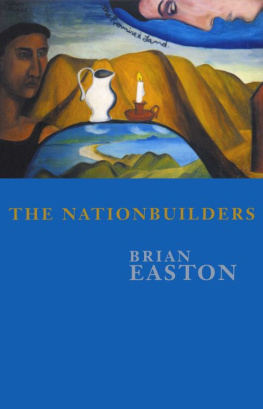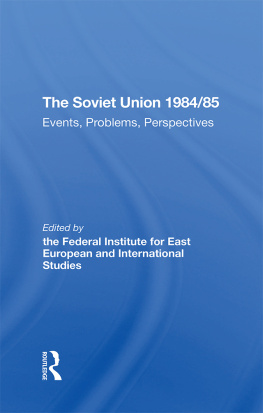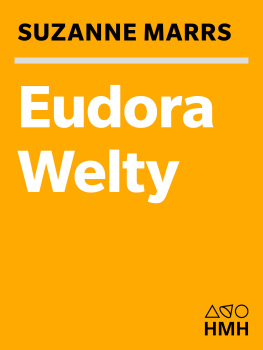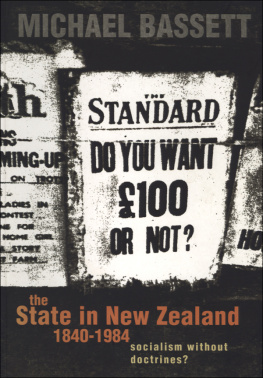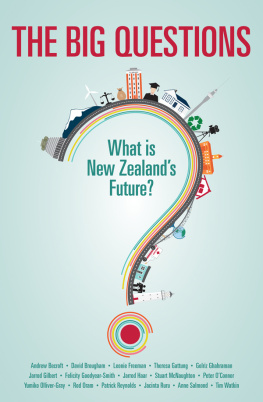I WAS THINKING ABOUT H ARRY as I wrote this book. His rather ordinary life contrasts with those the book focuses upon. And yet, the lives of ordinary men and women were just as important, and just as illustrative of the times.
Harry was born in 1918 in Silverstream Hospital, near the Trentham military camp where his father was based. The family tradition is that he was born in a tent, for New Zealand was still at war. One doubts a tent would have lasted long in the Wellington wind. The delivery room must have been a makeshift building (although given the way we run our hospitals, it probably lasted half a century).
I wondered how much GDP had increased in the 82 years that he lived. Our best estimate suggests it grew at an annual average of about 1.5 percent per person. Today the economy is about 10 times bigger and the average person about 3.2 times better off measured by material output than when Harry was born. That does not allow for all the quality change. I should think that todays maternity hospitals are more than 3.2 times better than Harrys.
Harry was the first of seven children. In contrast he was to have three and each of his children two. Family size has diminished over the years. One cause has been womens changing aspirations. Harrys mother stayed at home (housework was onerous in those days), his granddaughters are employed outside the home. His father was a railway clerk in Christchurch, until a blood disease from the Great War got the better of him. That was in the 1930s, when they had also taken in an invalided grandfather. There was no comprehensive social security so times were tough. To support the family, Harry left school as soon as he could, drifted from job to job, until he became an electrician specialising in rewiring the armatures of motors. He did this part-time into his sixties, for it involved such specialised skills, few others followed. The job was created by import controls. Burnt-out motors had to be recycled. In any case they came in such a variety that there was no certainty one could be replaced.
Harry benefited greatly from the welfare state. He was married in 1940 (missing war service by not being medically fit). He had job security. You could walk out on a bad boss (there were a few) and immediately find another job. There was even a bit of overtime. His kids got decent health care and education, in a benign if not inspiring social environment. In the mid-1940s the family moved into a state house. He died in one, except it had been bought from the state 50 years earlier (on favourable financial terms). His wife, Thelma, went out to work as a school secretary to pay off the second mortgage.
Harry played a lot of sport, and did more than his fair share of its administration. It was sport that gave him the big chance. Forty years ago the Christchurch City Council did not allow sport on its grounds on Sundays. So enthusiasts played out at the Templeton Hospital for intellectually disabled men and women instead. One of its staff asked Harry if he had thought of working as a psychopedic nurse. Changing careers halfway through his life, Harry proved to be a very good nurse, for he was fascinated by the technical side, and cared greatly about the patients and fellow workers. (For a while he was a PSA union delegate.) The hours were long and there was the shift work, but the pay was good. He became a charge nurse, not seeking farther promotion because he wanted to be hands-on rather than an administrator. After retirement, he kept in touch with the hospital until it was closed down. It was not a job but his profession. Had he the chances of later generations he might have been a doctor.
He retired in 1983 on New Zealand Superannuation, topped up by a small employer-subsidised occupational pension from the National Provident Fund, and a freehold house. He kept himself busy helping the neighbours, friends, and family. He was bewildered by post-1984 governments apparent desire to cut the welfare state that had given him so much.
In his mid seventies, he had a bad lung infection on top of emphysema and almost died. (Yes, he had smoked for 40-odd years.) The local hospital gave him superb support as an inpatient, and then as an outpatient when he returned to moderate health. In April 2000, he died peacefully (and suddenly) from a dissected aneurism in his eighty-second year. The hospital staff were again marvellous. The health system to which he had given so much in his working life returned the favour, the state to whom he paid his taxes supported him in his need.
At Harrys funeral, I thought of the men and women, who each made their own contribution, and without whom the nationbuilders of this book would never have succeeded. Ordinary people like Harry Harold Easton Dad.
T HIS BOOK HAS A LONG HISTORY , and accordingly there is a long list of those I have consulted and/or harassed. In some cases I have cheerfully plundered their written works (but usually, I hope, with specific acknowledgement). While apologising for the inevitable oversights, others (each in their own way a nationbuilder) include the following:
Barry Ashwin; Rachel Barrowman; Michael Bassett; Ann Beaglehole; Wyn Beasley; Lisa Beaven; Luit Bieringa; Tim Bollinger; Rob Bowie; Bert Brownlie; Margaret Clark; Baerbel Czennia; Ellen Dannin; Sonja Davies; Graham Dunstall; Rosemary du Plessis; Kelly Easton; Tamatea Easton; Thelma Easton; Hugh Fletcher; James (J.C.) Fletcher; Geoff Fougere; Peter Franks; Sarah Gaitanos; David Galt; Ina Gerbich; Alan Gray; David Greasley; Ana Gilling; Don Gilling; Marg Gilling; Bill Guest; Morris Guest; Barry Gustafson; Natasha Hay; John Henderson; Anthony Hubbard; Kerr Inkson; Keith Jackson; Bruce Jesson (d); Joce Jesson; Graham Kelly; Michael King; Henry Lang (d); Elsie Locke (d); Dennis McEldowney; Malcolm McKinnon; Brent McClintock; James McNeish; Bill Manhire; John Martin; John Mowbray; Peter Munz; Adrienne Nolan; Gordon Ogilvie; Claudia Orange; Keith Ovenden; Les Oxley; Vincent OSullivan; Jock Phillips; Bryan Philpott (d); Margaret Philpott; Bill Renwick; Peter Rogers; Dennis Rose; Wolf Rosenberg; Geoff Schmitt; Jane Scott; Peter Simpson; Tony Simpson; Mary Sinclair; Shirley Smith; Ross Somerville; Karl Stead; Jacquie Sturm; Helen Sutch; Hugh Templeton; John Tizard; Bruce Wallace; Nelson Wattie; Ian Wedde; Shirley Williams; and David Young.
To them, I add the institutions which have hosted me while the book was being written: the Department of Politics of the University of Auckland and the Stout Research Centre, as well as the staff of TheListener, those who made TheDictionaryofNewZealandBiography the extraordinary resource it is, and the archivists and librarians of New Zealand, including those at the universities of Auckland and Canterbury and at Victoria University, the Wellington City Council, Archives New Zealand, the Alexander Turnbull Library and the National Library.
The director of Auckland University Press, Elizabeth Caffin, has been closely involved with this book from the conception stage, providing encouragement and constructive criticism, as well as leading an effective production team of Katrina Duncan, Annie Irving and Christine OBrien. Simon Cauchi was once more a much-appreciated editor. Janet Hughes prepared the index.



